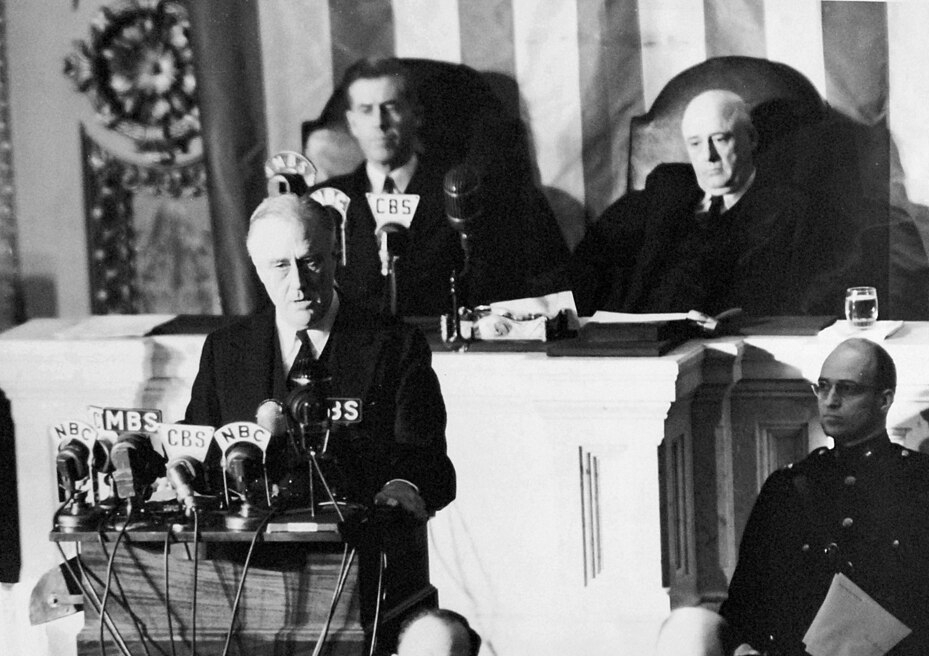Woodrow Wilson and Franklin D. Roosevelt’s Wars on Civil Liberties
Without question these two books are revisionist efforts that reflect profound reservations about Wilson and Roosevelt that stem from critics on both the left and the right.

‘Woodrow Wilson: The Light Withdrawn’
By Christopher Cox
Simon & Schuster, 640 pages
‘The New Deal’s War on the Bill of Rights: The Untold Story of FDR’s Concentration Camps, Censorship, and Mass Surveillance’
By David T. Beito
Independent Institute, 404 pages
Christopher Cox begins his biography as if to hail Woodrow Wilson as conquering tragic hero, his “active presidency” cut short by illness, his legislative legacy one that continues to dominate American life in the 21st century; among his achievements were the progressive income tax, the Federal Reserve, the Federal Trade Commission, the National Park Service, and the Clayton Antitrust Act, not to mention the Wilsonian idealism in foreign policy advanced by a wartime president.
Yet after more than 2,000 books in English on Wilson — by Mr. Cox’s count — the dismemberment of his reputation resounds; he’s seen as a racist, sexist president who suppressed civil liberties (see Chapter 21, “The ‘Firm Hand of Stern Repression’”). Certainly in the light of what matters today, Wilson is found wanting — still a consequential president, to be sure, but actually more in line with the shameful figure author John Dos Passos denounces in “1919.”
In David Beito’s book, Franklin D. Roosevelt, who served as assistant secretary of the Navy in Wilson’s administration, and was rightly regarded as the heir of Wilson’s progressive policies, is an even more suspect figure. Like Mr. Cox, Mr. Beito is perforce obliged to acknowledge his subject’s seemingly unassailable reputation: “Few presidents have ranked higher in the estimation of scholars than Franklin D. Roosevelt.” He is in the top three of “greatest” presidents, winning plaudits for his New Deal creation of the “welfare-regulatory state,” and the only president, “other than perhaps Abraham Lincoln,” to be “favorably cited as a model for leaders to emulate in a national crisis.”
By the second paragraph of Mr. Beito’s introduction, the internment of Japanese Americans is cited not as a “glaring” or “painful” exception to Roosevelt’s civil liberties record, but the result of a Wilsonian ethos that regarded the “protections of the Bill of Rights, while laudable in theory,” as taking “second place when they conflicted with policy goals considered more vital.”

Via Wikimedia Commons
Mr. Beito notes Roosevelt’s “unquestioning support for Woodrow Wilson’s crackdown on free speech during World War I, including his enforcement of the Sedition and Espionage acts.”
His book is history and biography as exposé, so that chapter titles read like a charge sheet: “The Necessary First Stage: Radio and the Quashing of a Free Speech Medium,” “A New Deal for Radio and a New Uniformity,” “‘Persons Whose Removal is Necessary’: FDR’s Concentration Camps.” Concentration camp is a loaded term, and others might favor detention camp when describing the treatment of Japanese Americans. Nonetheless, it is a story of a people terrorized, brutalized in camps that featured guard towers and spotlights.
Mr. Beito is especially adept at pointing out New Dealers who promoted both the internment of Japanese Americans and restrictions on the “isolationist” press. He quotes novelist Rex Stout: “Japanese-Americans include more fifth columnists than any other comparable group in the United States.” Stout dismissed the dissent of a socialist leader, Norman Thomas, who condemned the camps as a “disgrace to our democracy.”
Without question these two books are revisionist efforts that reflect profound reservations about Wilson and Roosevelt that stem from critics on both the left and the right, though, as Mr. Beito points out, the tendency among liberal historians is to give Roosevelt if not a pass, then at least an exculpatory phrase of regret that his actions were not in keeping with his otherwise democratic spirit.
Both biographers show that Wilson and Roosevelt were willing, at key moments in American history, to suspend civil liberties, and with a mindset that was not merely the result of the exigencies of the moment but rather a longstanding education. Mr. Beito notes that one of Wilson’s Johns Hopkins professors, Richard Ely — educated in Germany and a proponent of a strenuous “social gospel” and coercive “progressive policies” — was “instrumental in shaping the ‘Wilsonian Idea’ of administrative efficiency and expertise under Governor Robert M. La Follette.”
In practice, as both biographers demonstrate, the fundamental principles of the Bill of Rights were too easily contravened in order to justify the ends of progressive policies and centralized administration.
Mr. Rollyson’s work in progress is “Making the American Presidency: How Biographers Shape History.”

